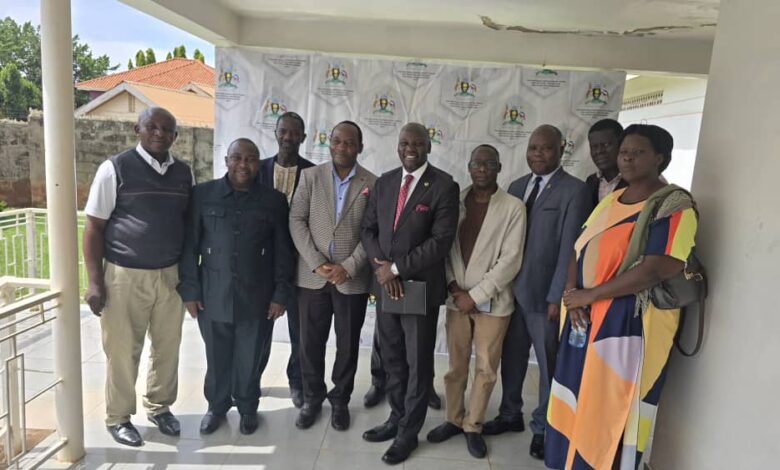DA, National Consultative Forum Discuss Electoral Reforms
Kampala|FileFactsUg

The leadership of the Democratic Alliance (DA) engaged the National Consultative Forum (NCF), a body uniting all 26 registered Ugandan political parties, to push for constitutional, electoral reforms, and national transition and reconciliation agenda.
Mathias Mpuuga, the National DA coordinator, led the DA delegation comprising some of DA promoters, Samuel Lubega Mukaaku, and Michael Mabike, and Henry Lubowa to the meeting that took place on March 28, 2025 at the NCF secretariat, while Godfrey Kiwanda, the chairperson of NCF, led the NCF team.
Being an umbrella constitutional institution with representation from all registered political parties, and organisations in Uganda, is mong the key stakeholders the DA set out to engage in their push for reforms.
The DA presented several key issues, including the need for downsizing the parliament from 529 to 295 MPs, the skewed method of constituting the Electoral Commission, and its structure etc.
In the engagement, Mpuuga emphasized the importance of allowing coalitions between political parties to register and gain operating power to strengthen democracy.
“When the multi-party dispensation was restored, there was some sort of discontent in some circles, as the intention was to restore them. But we now need them because they are the engine of political maturity and evolution,” Mpuuga said.
He explained, “Political parties give us leaders, they mobilise and train leaders, and they give the nation some sense of political orientation. The current law is prohibitive of party arrangements that relate to working together.”
He however, explained that the current law prohibits party arrangements that relate to working together, making it difficult to register meaningful coalitions.
“The major inhibition therein is that in the current state, it is very difficult to register a meaningful coalition between [political] parties. Whereas the law allows coalitions to be formed, it is inhibitive of how they can function because you will not register a coalition, and use the same symbol,” he added.
“…if today we want to register a coalition with the DP, I would register it with the EC, but each will retain their symbol…a simple amendment to the act will make it feasible, and possible for parties to form a coalition, register it, and use one symbol…” Mpuuga said in making a case for registered coalitions.
The DA, therefore, proposes an amendment to the act to make it feasible for parties to form a coalition, register it, and use one symbol.
On the issue of the Electoral Commission, Mpuuga highlighted the need for reforms in its appointment, constitution, and structure.
“…we [DA] believe part of the problem with the Electoral Commission is how it is appointed, how it is constituted, and the structure,” Nyendo-Mukungwe MP, and Parliamentary Commissioner said.
He also emphasized the importance of allowing prisoners and Ugandans in diaspora to exercise their right to vote.
“But also in the EC Act, we want to amend it so that the EC can make provisions for the voting of prisoners and Ugandans in diaspora. It is one of the things I think is not too late to be undertaken. Registering Ugandans in the diaspora only requires amending the EC Act.”
Mpuuga thus proposed amendments to the EC Act to gazette High Commissions/Embassies, missions as polling stations, and appoint returning officers. He also stressed the need to gazette prisons as polling stations and appoint prison officers as presiding officers.
“[The law needs] to say that the Electoral Commission will gazette High Commissions/Embassies and missions as polling stations, and will appoint the following officer to be the returning officer on a polling day and then we will ask all Ugandans under certain jurisdictions with passports to go and register to vote,” he explained.
“[The law needs] to say that the Electoral Commission shall gazette the prisons as polling stations nd will appoint the prisons officer at a particular level as a presiding officer, certain rights can be taken away when you are a prisoner, but civic rights cannot be taken away. It’s a ruling of the Court,” Mpuuga said.
The DA urged the National Consultative Forum leadership to ignite a debate on several legal regimes as proposed by them.
Mpuuga informed the NCF members that he has already written to the Speaker of Parliament, seeking space on the order paper to introduce eight bills to amend the following acts for the country to achieve a meaningful electoral process, starting with the forthcoming 2026 elections.
- Presidential Elections Act
- The Parliamentary Elections Act
- The Local Government Elections Act
- The Political Parties and Organizations Act
- The Electoral Commission Act
- The Referendum Act
- The National Devolution Act
- The Proportional Representation (National Electoral System) Act
Mpuuga emphasized that a candid dialogue on the national transition and reconciliation is both imminent and inevitable, affirming that despite living in denial, Uganda is a hurting nation.
The chairperson of the National Consultative Forum, Kiwanda, commended the DA team for coming up with such important proposals, stating that if addressed, passed, and implemented, they could resolve a conundrum of political and leadership questions Uganda has perennially grappled with since independence.
